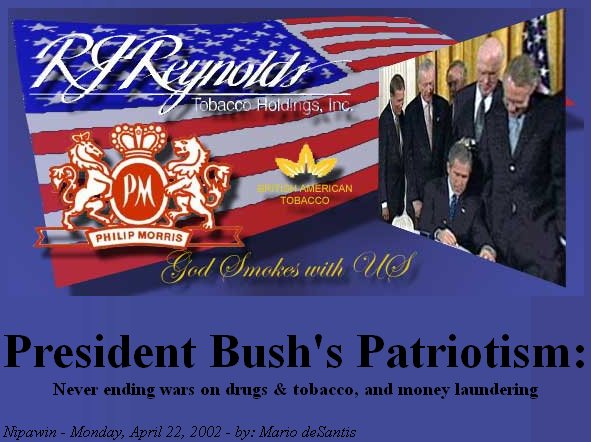Learning Stories
by
Mario deSantis
mariodesantis@hotmail.com
“I am a Canadian, free to speak without fear, free to worship in my own way, free to stand for what I think right, free to oppose what I believe wrong, and free to choose those who shall govern my country.” - -The Rt. Hon. John Diefenbaker, Canadian Bill of Rights, 1960
“The whole judicial system is at issue, it's worth more than one person.”--Serge Kujawa, Saskatchewan Crown Prosecutor, 1991
“The system is not more worth than one person's rights.”--Mario deSantis, 2002
Ensign Stories © Mario deSantis and Ensign
|
|
It was yesterday that we pictorially described how US money from smuggled Colombian drugs was being laundered with the purchase of (smuggled) American cigarettes and other goods in Colombia. This afternoon, I woke up after a short nap and all of a sudden the "Tobacco Traffic" documentary by NOW with Bill Moyers was being aired. What I was surprised to know is that Philip Morris, RJ Reynolds and British American Tobacco were being sued by the governments of Colombia and other European countries for the recovery of tax revenues circumvented for the smuggling of cigarettes in these countries. The tobacco companies contended that in accordance with the Revenue Rule, an 18th century common law, the US courts have no jurisdiction over the collection of foreign taxes.
However, in presenting the money laundering act, GOP Representative Michael Oxley removed the above mentioned section at the order of the White House and GOP whip Tom DeLay, under pressure from the tobacco companies. As a consequence, on February 19, a US District Court judge dismissed the European and Colombian lawsuits on the grounds of the Revenue Rule. Reference: |

 The
Patriot Act, passed in October 2001, was supposed to tighten the
financial opportunities for money laundering and its draft contained
a section which included money laundering as "fraud or any scheme to
defraud against a foreign government."
The
Patriot Act, passed in October 2001, was supposed to tighten the
financial opportunities for money laundering and its draft contained
a section which included money laundering as "fraud or any scheme to
defraud against a foreign government."
